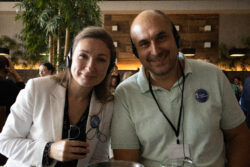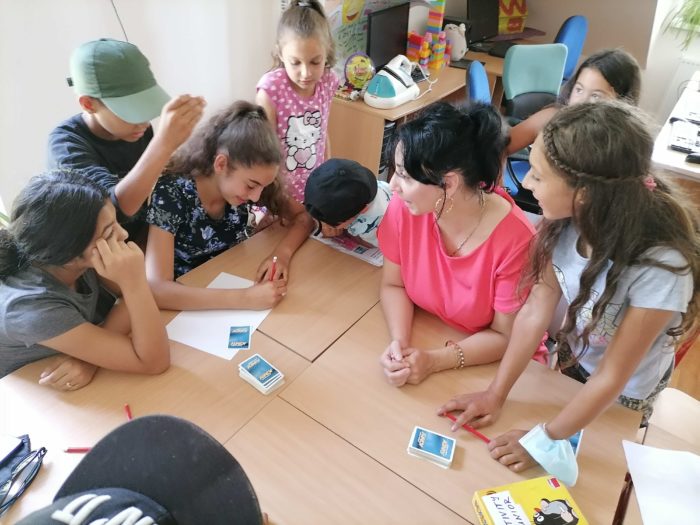
Záverečná konferencia k projektu
04. 10. 2023

Mrs Kazimírová, how was your journey to the director’s chair in Petrovany?
I’ve been working in one place, here in Petrovany, since I graduated from college. It’s been more than 31 years. I know the local children, I know the parents I taught, and as long as the kids don’t give me messages saying ‚the grandmother you taught says hello‘, I say to myself, that’s good. 😊 I have great colleagues, we can laugh together but also exchange opinions that may not always agree, we can take serious measures and decisions that improve the direction of the school. We avoid conflicts, we discuss a lot together, we look for solutions.
What do you consider most important in your approach to students?
We treat all children as partners. We encourage them to confide in us, to tell us what is bothering them, how we can help them. We try to talk to them, to find common ground, to look for a way out if there is a problem. As we have quite a lot of children from low-income backgrounds, we motivate them to attend school regularly. The biggest problem for these children is irregular school attendance. These are the so-called weekend children, that is, those who are at school for two days and at home for five days. If they went to school regularly, they would be able to acquire more knowledge and skills, to learn much more. Many of them would be able to finish secondary vocational schools and enter the labour market. Unfortunately, background and family often do not motivate them, as even the parents themselves do not give much importance to education. Of course, we also have Roma parents who have found a job on the labour market, whether as tradesmen or employees. These parents cooperate with the school, they are interested in the school grades of their children.
Who helps you motivate them in your work?
Field social workers are involved, and we also have good cooperation with your community centre, which I very much appreciate. We communicate, we solve together the educational issues and educational problems of the children entrusted to us, we help them with the curriculum. We teach them how to look for information, for example, when doing school projects. We don’t do it for them, but we guide them to be independent. If I see that a child needs help, I call your colleague Marcel and ask him to contact the family and help the child. Do you know what beautiful projects they are able to create when someone guides them, helps them? These children have a lot of potential and we are trying to create the conditions for them to use it. We have an example of a boy who repeated a grade, but today his knowledge is much greater, and his grades correspond to that. And that’s only because he started going to school properly and regularly. We try to send the children to your community centre so that they not only learn something after school, but also play and have a good time.
During class, we also have assistants to help us. They also work with children who have returned from abroad and have to catch up on what they have missed. (note: many families from Petrovian go to the UK to work). However, I must point out that we also have responsible families that consider education important. We urge them to send their children to school at all times. Even if they fall asleep, even if they are not ready. The era of ‚no papers‘ is coming to an end. Everyone needs an education.
In your school, you have decided to be the first to implement the content of our career guidance manual and to include its practical part in the classroom. The result is a subject called Preparation for a career, which is taught by your teacher Zuzana Žarnayová to eighth graders. How would you assess the interest and response to this subject?

It was this 8th grade that we found most appropriate in terms of the children’s cognitive abilities and goal-orientedness. It is very good for them to get an overview of different professions. They enjoyed the lessons, they were interested in them. We even had demonstrations of the different professions to motivate the pupils to study the field even more and they also went on excursions. Our teacher has done this very well, this subject also fills the space of educational guidance. We would like to continue it in the future.
Finally, what advice would you give to other schools who are concerned about inclusion?
It’s just a mind set. A child, whatever his background, needs to be educated, and that is already our mission. It doesn’t always go smoothly, and often we are worried, for example about the new curriculum, we are worried about whether we can handle it, how are we going to work with children from excluded communities? We need support teams, assistants, without whom I can no longer imagine working in a school. We also want to move forward, there is a lot of competition among schools, we are fighting for every pupil. As I mentioned in the introduction, we need to set our minds that it can be done.
Finally, I would like to add that I appreciate parents who come to school with problems, but talk to us in a polite way. Those with whom we have a dialogue. Who understand that we don’t want to hurt children, but to help them. And I also appreciate our male and female teachers for their enthusiasm and work with the children..
Thank you for speaking with us and we wish you every success in your future endeavors and many happy graduates.
Array